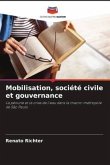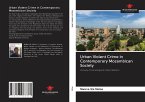In recent years, social participation has become an increasingly important factor in consolidating democracy and developing citizenship. With the participation of civil society, conflicts arise in the face of a centralising political culture, both in decisions and in the maintenance of power by groups that dominate political, economic and cultural resources, where the consensus and consequences of public policies in relation to water governance affect civil society. Recent events involving the water crisis in the Macrometrópole Paulista (MMP) denounce the scarcity and reveal the current and real management of water. Indispensable for human survival, this context has triggered new articulations between government, institutions and society. In this scenario, the fight for the environment has come to occupy previously unoccupied arenas. The participation of civil society in water management unveils various conflicts involving different actors in the face of inequality and negotiating conditions.
Hinweis: Dieser Artikel kann nur an eine deutsche Lieferadresse ausgeliefert werden.
Hinweis: Dieser Artikel kann nur an eine deutsche Lieferadresse ausgeliefert werden.








